Note: This biography was written at the request of the University of Washington Archive to accompany the papers of Robert P. Adams, PhD. there.
Academic Overview
BA English, Oberlin College, Oberlin, OH; PhD English, University of Chicago, 1937. Assistant Professor English, Michigan State University, East Lansing, MI, 1938-1947; Associate Professor English, University of Washington Seattle, 1947-1961; Full Professor English University of Washington Seattle 1962-1979. Listed in Who’s Who in America, 1962-1979.
Biography of Robert P. Adams, Ph.D.
Robert P. Adams, PhD, (1910-1994) taught English Literature at the University of Washington from 1947 to his retirement in 1979. Starting as an Associate Professor, he became a Full Professor in 1962 with the publication of his book, The Better Part of Valor: More, Erasmus, Colet, and Vives on Humanism, War, and Peace, 1496-1535 (University of Washington Press, 1962). After its publication, he was listed for six years in “Who’s Who in America.”
Robert taught Shakespeare courses every year in addition to other English Renaissance authors. He also created a course called Social Ideals in Literature that included a range of authors who wrote on the ideal society, such as Thomas More, Utopia, Samuel Butler, Erewhon and Edward Bellamy, Looking Backward. He also taught correspondence courses through the University of Washington correspondence study program and enjoyed his contacts with students all around the West and some abroad. His first love was teaching and he always placed high in the annual rankings of professors by students at the University of Washington.
Robert was born in 1910 in Highland Park, Michigan, a close suburb of Detroit, second of what would become six children of William H. Adams and Florence G. Adams. His parents were of English and English and French background respectively, residing in this country since the 1800s. His father was one of ten children of whom nine survived to adulthood and grew up on farms in upstate New York and Pennsylvania. William H. credits his mother as the driving force for education in the family in an era where children graduated 8th grade, then went to work on the family farm. With ten children, William H’s family could not help him financially. William H. put himself through engineering school at Ohio Northern University, Ada, Ohio, which had a policy of low tuition to help students who otherwise could not afford to go to college. There he met Florance Gossard, who grew up on a nearby farm. She taught school in a one room school house for several years before attending Ohio Northern for one year before her mother called her back to work on the farm.
The newlyweds arrived in Detroit in 1907 and settled in near suburb Highland Park where their six children were born. Florence taught all six children to read at home before they arrived at school.
William H. became a prominent civil engineer in Detroit, first working for firms, then with a partner, and then as head of his own firm. There was a great period of development and expansion in Detroit at that time, and William H. provided underpinnings for many buildings. Detroit remains noted for excellent architecture.
Stable and prosperous though the 1920s, the family had live-in help and a summer cottage at Kingsville, Ontario, Canada, on Lake Erie. Robert and his two brothers became Eagle Scouts and all three attended Scout camps in Upper Michigan. The children all had music lessons; Robert played the trumpet. The family was very active in Trinity Methodist Church, Highland Park. William H. was elected to the School Board. William H. and Florence deeply appreciated the good schools, excellent public library, and scout troops of Highland Park, advantages they did not enjoy in their own rural childhoods and were happy to give their children.
Robert was always a top student. He acquired outdoorsman skills from scouting and strong gardening skills from his parents that he retained all his life. He was also athletic and played on his high school and college basketball teams, an asset at 6 feet 2 inches tall.
William H. and Florence decided to send all of their children, three boys and three girls alike, to Oberlin College, Oberlin, Ohio, a college they admired. The oldest got through before the crash on 1929. Robert was not so fortunate. He waited table and did dishes in the dorm for board and worked summers painting the Highland Park schools to make money for college. Despite the Great Depression, all six children were gotten through Oberlin, albeit with gap years, a heroic feat by William H., Florence, and the children themselves.
First a chemistry major, Robert’s path was changed by several English professors who took a personal interest in him and inspired him. He changed majors to English and his professors got him a fellowship to attend an extra year to earn a BA in English in 1931, the middle of the Great Depression. They helped him again to get a fellowship to the University of Chicago to work on his PhD in English, He was further aided by several more scholarships from that University., including the Senior Fellowship, the highest then awarded there. Robert’s fiancée Roberta England, also an Oberlin graduate, lived in Chicago. They were married in 1932. Roberta worked as a social worker in the newly created Relief Administration under the Illinois Emergency Relief Commission created to help needy Illinois residents while Robert worked on his PhD and held a library job at the University of Chicago. The young couple had a modest apartment and enjoyed going to theatre, concerts, and ballet, albeit from the balcony.
Robert had long been interested in political, social and economic ideas in literature. He concentrated on the Renaissance under Professor Charles H Baskerville and proposed research on the early English humanists (Mores, Erasmus, Colet and their circle 1500-1535) and their ideas on war, peace, and a well-ordered society for his dissertation. His thesis was titled Pacifism in the English Renaissance 1497-1530: John Colet, Erasmus, Thomas More, and J.L. Vives. Robert remained interested in these themes for his entire life.
After completing his course work and while writing his dissertation, Robert took a fill-in position at Cornell University, Ithaca, NY, and was instructor in English for a year at Parsons College, Fairfield, Iowa, He was awarded his PhD from the University of Chicago in 1937.
Due to his chemistry background, Robert was that rarity: an English professor who was scientifically literate.
Robert accepted a position as Assistant Professor at Michigan State University, East Lansing, Michigan, and he and Roberta moved there. Their first child, Robert W. Adams, was born there in 1938, followed by a daughter, Claire, in 1943. The couple lived in a rental house and enjoyed an active social life with other university faculty, together with family visits to Detroit and Chicago. Robert volunteered for the Navy during World War II, but was rejected due to his color blindness. During the War, he taught in the Air Force program at Michigan State. He planted and maintained a huge victory garden to aid the war effort and Roberta canned hundreds of jars of tomatoes, beans, and corn.
An offer of tenure in 1947 as Associate Professor from the expanding University of Washington Seattle was too tempting to resist for a child of the Depression. He accepted this lifetime job without even a visit to Seattle although far from his family in Detroit and Roberta’s family in Chicago. The family of four drove out to Seattle in their 1945 Pontiac, camping in parks along the way across the country to begin a new chapter. The couple bought a house in the Wedgwood neighborhood of Seattle, not far from the University of Washington. Theatre and concerts were a regular part of life. The two children attended Seattle Public Schools.
Robert put in a large vegetable and flower garden by the house and planted several trees in the huge front yard. He was also an avid amateur photographer. He built a dark room in the basement of the houses and developed and printed his own photos.
With his siblings scattered around the country in Toledo, OH, Eugene, OR, and Montclair, NJ, and parents in Highland Park, MI, Robert was a frequent correspondent as were all of the family, raised as they were in a culture of letter-writing. Long distance calls were very expensive and reserved for illness or death in the family. Cross-country family trips by car in the summer to Highland Park for family reunions at his parents’ home were a regular feature of the life of Robert and his family in the 1950s. The family would camp in national parks along the way.
Robert was awarded fellowships and grants at the Folger Shakespeare Library, Washington, DC, the Newberry Library, Chicago, and the Huntington Library, Pasadena, CA, through the years to do research and write what would become many articles in scholarly magazines and eventually The Better Part of Valor, in addition to three unpublished books, Passions’ Storm: What Happens in Chapman’s Original Bussy d’Ambois vis-a-vis Shakespeare’s Hamlet (1968); The World’s a Stage: An Approach to Renaissance English Drama Exclusive of Shakespeare (1978), and The Abuse of Greatness: Shakespeare, Greville, Marston, Chapman and Ben Jonson, The Late Elizabethan Tragic Sense of Life c. 1586-1603 (undated). Robert corresponded regularly with people he met at the various libraries where he did research.
Friendship with fellow English professor and editor of the Modern Language Quarterly Edward Cox led to cruising Puget Sound on Eddie’s 30-foot yacht Juno. The two would go out for a week every summer in addition to smaller jaunts around the Sound. Being First Mate also involved helping to maintain the Juno’s wooden hull, which needed to be scraped and repainted regularly. He was a member of the Queen City Yacht Club in Seattle. Cruising appealed to Robert’s adventurer side. As a teen, he loved to read tales of adventure at sea, especially one called Cast Up by the Sea, by Samuel Baker, which he read and reread.
Son Robert William was a top student and was given a scholarship to Phillips Exeter Academy, New Hampshire, at age 15. Robert felt that this was an unequalled opportunity and Robert William went off to this East Coast upper crust enclave whose idea of diversification at that time was someone from the West Coast. Daughter Claire was also an excellent student, attending Seattle public schools.
English professors do not make a great deal of money and the family could not save much. The couple decided that Roberta should go back to school and get an MSW, which she did in 1953. She worked with an adoption agency in Seattle and the family became a two-income household, unusual at that time.
In 1960, Robert and Roberta divorced and Robert married Marjorie Ford, a social worker with a young daughter, Emily. The couple traveled to Europe on their honeymoon and took up residence in the house in Wedgwood. With the publication of The Better Part of Valor, Robert was promoted to full professor at the University of Washington in 1962. He was then listed in Who’s Who in America.
Influenced by his second wife, an active Unitarian, Robert attended the University Unitarian Church regularly. On the death of his friend Edward Cox, Robert inherited the Juno, which sank at the dock. He bought a 30-foot yacht with a fiberglass hull that he named Nepenthe, and he and Marjorie often cruised around Puget Sound. The couple traveled to Mexico, Canada, and Europe several times. Robert got a fellowship to the Newberry Library in Chicago, where he worked on his unpublished book, Passions’ Storm: What Happens in Chapman’s Original Bussy d’Ambois vis-a-vis Shakespeare’s Hamlet (1968). The fellowship included nine months in Chicago at the Library followed by three months at the British Museum, London.
Robert was a supporter of the arts, donating to the Seattle Repertory Theater, Intiman Theater, the Pacific Northwest Ballet and the Seattle Art Museum. He was a lifelong Democrat and a member of the American Civil Liberties Union. He was a founding member of Group Health in Seattle, then a pioneering medical practice.
Robert W. graduated from Harvard and MIT, becoming an architect. Daughter Claire attended Oberlin and graduated from New School University, New York, NY, becoming a newspaper reporter, researcher, legal assistant, and later working in web and marketing. Both married. Robert W. had two children, Matthew and Sarah, and Claire had one daughter, Natasha.
Marjorie died in 1980 of cancer at age 60. Widower Robert remained in the Wedgwood house. He continued to correspond with the scattered family, including the new generation, and to visit family around the country. A highlight of this period was a month-long tour to China at age 79, a trip he often mentioned.
Robert died July 4, 1994 of cancer of the pancreas after a short final illness. He was cremated and his ashes scattered in Puget Sound, site of so many enjoyable outings on his boats. A memorial service was held at the University Unitarian Church and an obituary appeared in the Seattle Times.
Publications
Published Book:
The Better Part of Valor: More, Erasmus, Colet, and Vives on Humanism, War, and Peace, 1496-1535 (University of Washington Press, 1962. 368 pp)
Published Textbooks:
Four paperbound texts (Seattle: University of Washington Division of Correspondence Study, 1967) Mimeographed.
-
- Shakespeare, 31 pp
-
- Shakespeare’s Comedies and Histories, 27 pp
-
- Shakespeare’s Tragedies, 79 pp
-
- Utopias and Social Ideals, 44 pp
Published Contributions to Books:
-
- “The Social Responsibilities of Science in Utopia, New Atlantis, and After”, originally in Journal of the History of Ideas, X (1949), pp. 374-398, reprinted in a collection of the best essays from the Journal by Harper & Row, Anchor book, 1965-66
-
- “Shakespeare’s Tragic Vision” in Pacific Coast Studies in Shakespeare, ed. Waldo McNeir and Thelma Greenfield (University of Oregon Press, 1966), pp. 225-233
-
- “Critical Myths and Chapman’s Original Bussy d’Ambois” in Renaissance Drama 1966, ed. S. Schoenbaum (Northwestern University Press, 1967), pp 141-161
Published Articles:
“The Philosophic Unity of More’s Utopia,” Studies in Philology, XXXVIII (1941), pp. 45-65
“What are the Arts?”, “Othello”, “Literature in a Time of Crisis”, and “An Introduction to the Movies”, Syllabus for a Course in Literature and Fine Arts (Ann Arbor, Mich, 1945), pp 1-3, 74-80, 80-83, 113-126
“A Plain Man’s View of the United Nations,” seven articles in the State Journal (Lansing, Mich. April 1945)
“Designs by More and Erasmus for a New Social Order,” Studies in Philology, XLIX (1945), pp. 131-145
“Pre-Renaissance Courtly Propaganda for Peace in English Literature,” Proceedings of the Michigan Academy for Science, Arts, and Letters, XXXII (1948 for 1946), pp. 431-446
“The Social Responsibilities of Science in Utopia, New Atlantis, and After,” Journal of the History of Ideas, X (1949), pp. 374-398
“Literary Thought on War and Peace in English Literature of the Renaissance,” Year Book of the American Philosophical Society 1955 (Philadelphia, 1956), pp. 272-277
“King Lear’s Revenges,” The News Bulletin of the Rocky Mountain Modern Language Association, XI, 2 (January, 1958), p. 4
“Gascoigne’s Master F. J. as Original Fiction,” PMLA, LXXIII, 1958, pp. 315-326
“Erasmus’ Ideas of His Role as a Social Critic, ca. 1480-1500,” Renaissance News (Renaissance Society of America) XL (1958), pp. 11-16
“Bold Bawdy and Open Manslaughter: The English New Humanist Attack on Medieval Romance,” Huntington Library Quarterly, XXIII (1959), pp. 33-48
“The Better Part of Valor: More, Erasmus, Colet, and J. L. Vives: Humanism, War, and Peace ca. 1496-1530”, Year Book of the American Philosophical Society, 1959 (Philadelphia, 1960), pp 626-627
Published Reviews:
- Edward Surtz, The Praise of Pleasure, in Renaissance News (Renaissance Society of America), XI (1958), pp. 129-133
- G. K. Hunger, John Lyly: The Humanist as Courtier, in Journal of Modern History, XXXV, (September 1963), pp. 287-288
Unpublished Books:
- Passions’ Storm: What Happens in Chapman’s Original Busy d’Ambois vis-à-vis Shakespeare’s Tragedies (1965)
- A Critical Study of the Original Bussy d’Ambois: George Chapman’s Hamlet (ca.mid-1960s, earlier draft of #1)
- The World’s a Stage: An Approach to Renaissance English Drama Exclusive of Shakespeare (1978)
- The Abuse of Greatness: Shakespeare, Greville, Marston, Chapman, and Ben Jonson- The Late Elizabethan Tragic Sense of Life ca.1596-1603 (mid-1970s)
Professional Activities
Paper read “How More and Erasmus Conceived a Life According to Nature or Reason as a Model for the Renaissance Social Order,” MLA, Section on English to 1650, Boston, 1940
Member, MLA Bibliography Committee for General Topic IX: Literature and the Arts of Design, 1941
Paper Read: “The Idea of Heroism in Homer and in Ernest Hemingway,” Michigan Academy of Arts, Science, and Letters, Ann Arbor, 1942
Paper read: “On the Cultivation and Preservation of Liberal Education,” before faculty in Liberal Arts of Michigan State College, 1943
Paper read: “The Social Responsibilities of Science in Some Renaissance Utopias”, MLA section on English to 1650, Washington, DC, 1946
Paper read: “Erasmus’ Earliest Ideas on War, ca. 1480-1500,” Michigan Academy of Arts, Science, and Letters, Ann Arbor, 1947
Paper read: “George Gascoigne: Problems of the Artist in Imaginative Prose,” MLA, section on period of Spenser, New York, 1950
Paper read: “Bold Bawdry and Open Manslaughter,” before Master and Fellows of Kirkland House, Harvard College, 1958
Paper read: “King Lear’s Revenges,” MLA English Drama section, New York, 1958
Editorial Consultant for Yale edition of Sir Thomas More’s Works, 1960
Paper read: “More, Erasmus, and Lucianic Irony,” Pacific Northwest Renaissance Conference, University of Oregon, 1960, This paper was accepted, but not read under rule limiting members to one for MLA, Comparative Literature section, 1958
Paper read: “Romantic Love—Death-marked vs Life-marked,” Renaissance Society of American meeting, Portland State College, 1962
Participant at Renaissance Society of American, Northwest section, annual meeting March 8-9, 1963
Editorial Consultant, MLA, 1963
Invited to serve as West Coast representative to the Council of the English Renaissance Text Society, 1963
Paper read: “Shakespeare’s Tragic Vision,” Pacific Northwest Renaissance Society (Renaissance Society of America), University of Oregon, March 1964
Nominating Committee, English Renaissance Text Society, 1964-65
Paper read: “Critical Myths and Chapman’s Original Bussy d’Ambois,” Pacific Northwest Renaissance Conference, University of Victoria, March 11, 1966
Participant in Pacific Coast Shakespeare Society symposium on King Lear, Berkely, CA, Feb. 11, 1967
Editorial Consultant, Northwestern University Press
Editorial Consultant, Duke University Press
Paper read: “Critical Myths and Approaches to Ben Jonson’s Major Comedies”, Renaissance Society of American (Northwest Renaissance section) conference, University of Alberta, March 16, 1968
Grants and Fellowships
1971-72: One year at Folger Shakespeare Library, Washington, DC
1964-65: Research grant ($1000) Huntington Library, Pasadena, CA
1964-65: Newberry Library Fellowship: Nine months at Newberry Library, Chicago and three months at the British Museum, London
1962: Ford Foundation $600 and Agnes Anderson Fund $500, grants in aid of publication of The Better Part of Valor
1960: Anderson Fund grant $300
1958: Fellow of the Folger Shakespeare Society, $600
1958: University of Washington research leave, $2400
1956: Folger Library grant, $250
1952: American Philosophical Society grant, $428
1952: Folger Shakespeare Library grant, $300
1952: Agnes Anderson Fund grant, $250
1952: University of Washington research leave, winter quarter
1948: Michigan State College research leave, $1200
1936: University of Chicago pre-doctoral fellowship, $600
1931: Oberlin College graduate scholarship, $300
By Claire Adams Yurdin
Burien, WA January 2024



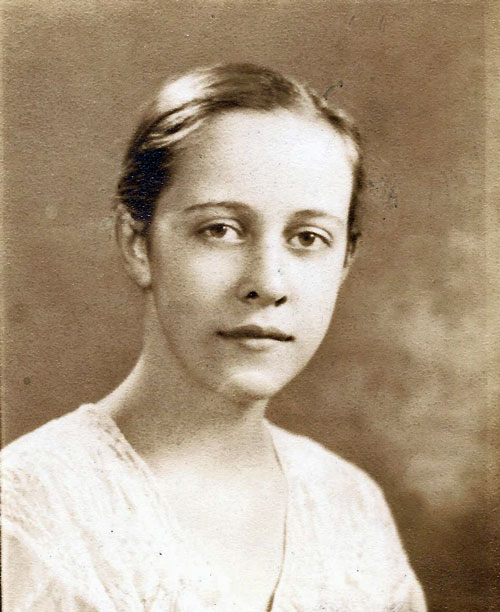
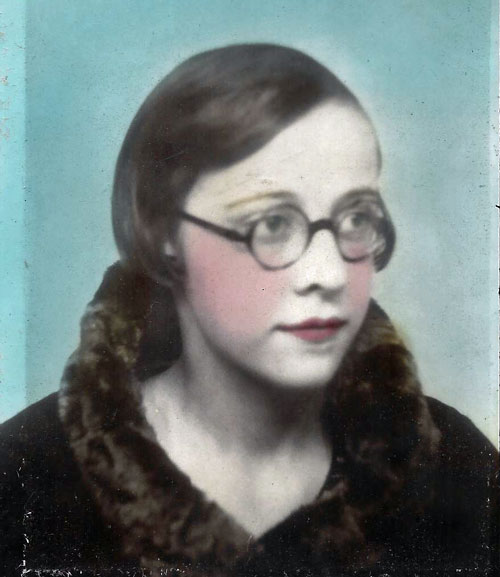
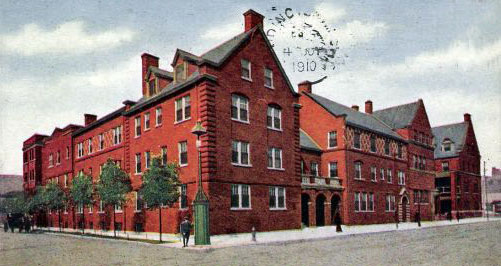 Hull House in 1910 (from a postcard). Hull House was a settlement house on the Near West Side of Chicago co-founded in 1889 by Jane Addams and Ellen Gates Starr to provide social and educational opportunities for working people in the surrounding area, many of whom were newly arrived European immigrants. At that time, the Near West Side was a mix of Italians, Germans, Jews, Greeks, Irish, and French Canadians.
Hull House in 1910 (from a postcard). Hull House was a settlement house on the Near West Side of Chicago co-founded in 1889 by Jane Addams and Ellen Gates Starr to provide social and educational opportunities for working people in the surrounding area, many of whom were newly arrived European immigrants. At that time, the Near West Side was a mix of Italians, Germans, Jews, Greeks, Irish, and French Canadians. 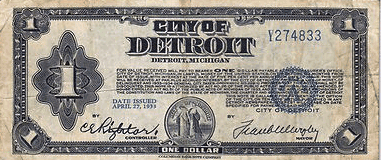

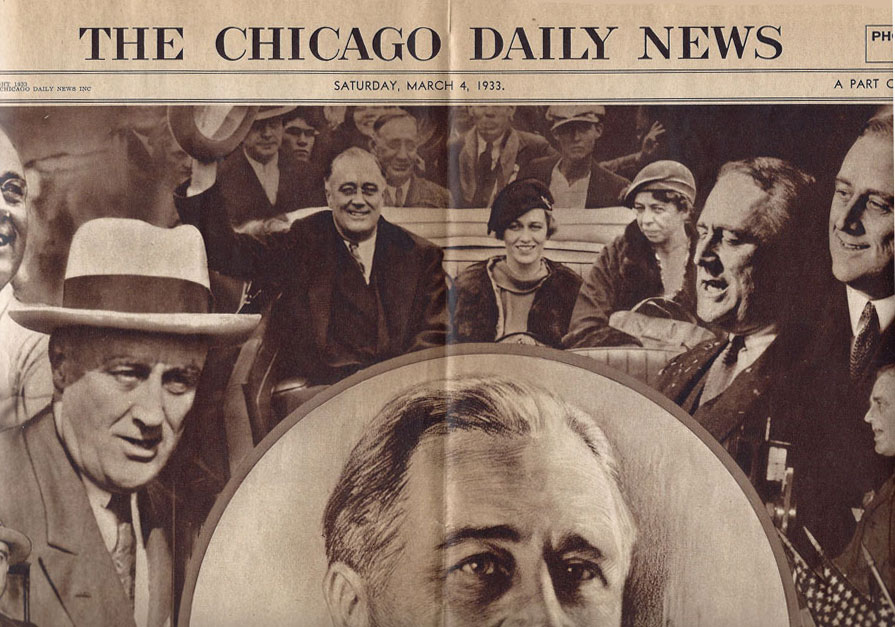
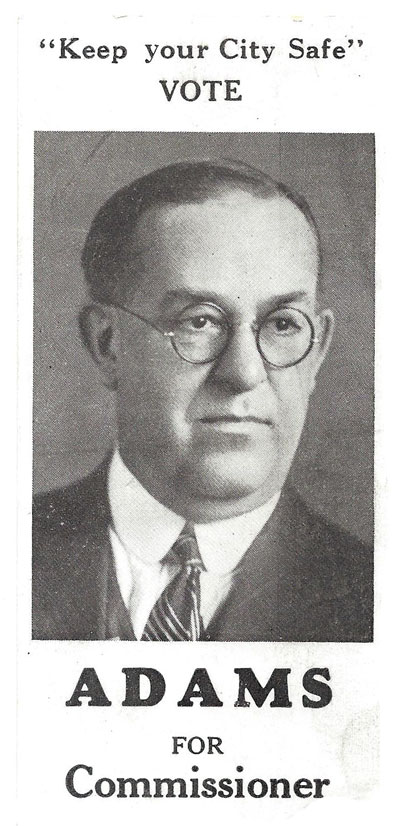 Flyer for WHA as Highland Park City Commissioner
Flyer for WHA as Highland Park City Commissioner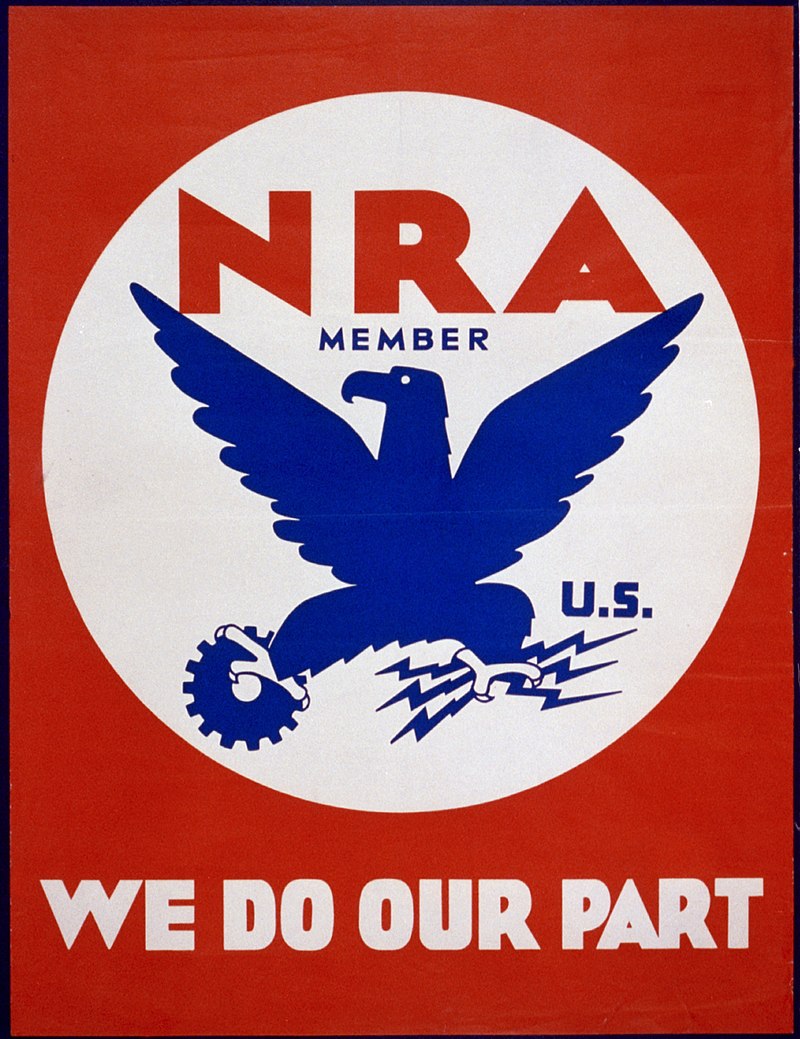 The National Recovery Administration (NRA) was a New Deal agency established in 1933. The goal was to eliminate race-to-the-bottom competition by bringing industry, labor, and government together to create codes of fair practices and set prices. The aim of the codes was to end destructive competition and to help workers by setting minimum wages and maximum weekly hours, as well as minimum prices at which products could be sold.
The National Recovery Administration (NRA) was a New Deal agency established in 1933. The goal was to eliminate race-to-the-bottom competition by bringing industry, labor, and government together to create codes of fair practices and set prices. The aim of the codes was to end destructive competition and to help workers by setting minimum wages and maximum weekly hours, as well as minimum prices at which products could be sold.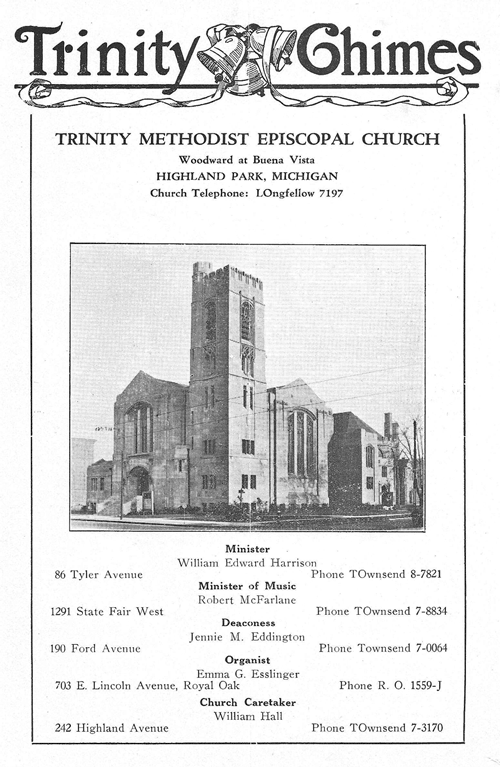 Trinity Methodist Episcopal Church Order of Services &
Trinity Methodist Episcopal Church Order of Services &  In an infamous incident, 3000-5000 unemployed Ford workers marched peacefully to the largest Ford factory, the Ford River Rouge plant in Dearborn, on March 7, 1932. The marchers wanted to petition Ford to rehire the unemployed, provide funds for health care, end racial discrimination in hiring and promotions, provide winter fuel for the unemployed, abolish the use of company spies and private police against workers, and give workers the right to organize unions.
In an infamous incident, 3000-5000 unemployed Ford workers marched peacefully to the largest Ford factory, the Ford River Rouge plant in Dearborn, on March 7, 1932. The marchers wanted to petition Ford to rehire the unemployed, provide funds for health care, end racial discrimination in hiring and promotions, provide winter fuel for the unemployed, abolish the use of company spies and private police against workers, and give workers the right to organize unions. 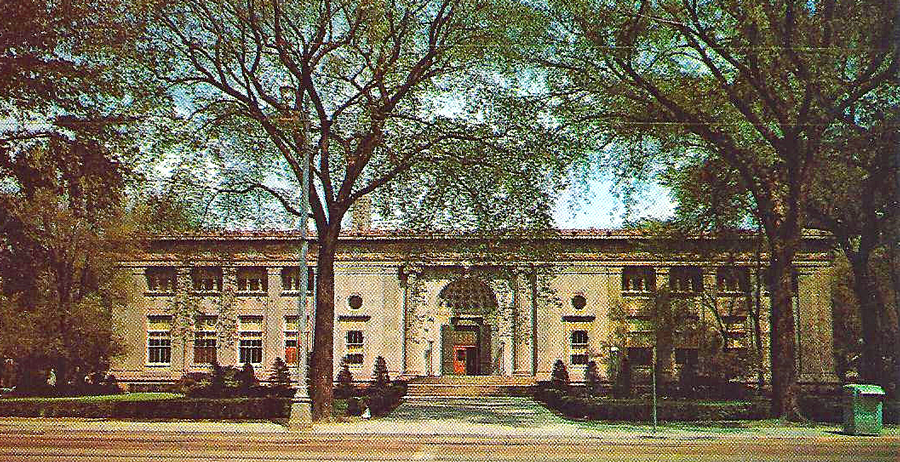 McGregor Public Library, Highland Park. Highland Park boasted a beautiful and well-stocked public library and the Adamses were frequent borrowers. The McGregors gave the land to Highland Park in 1918, stipulating that the city build a substantial and attractive library there. At that time, Highland Park was a prosperous, growing city of about 50,000 with a strong tax base, upscale housing, the Ford assembly plant, and other factories that would soon be merged into the Chrysler Corporation.
McGregor Public Library, Highland Park. Highland Park boasted a beautiful and well-stocked public library and the Adamses were frequent borrowers. The McGregors gave the land to Highland Park in 1918, stipulating that the city build a substantial and attractive library there. At that time, Highland Park was a prosperous, growing city of about 50,000 with a strong tax base, upscale housing, the Ford assembly plant, and other factories that would soon be merged into the Chrysler Corporation.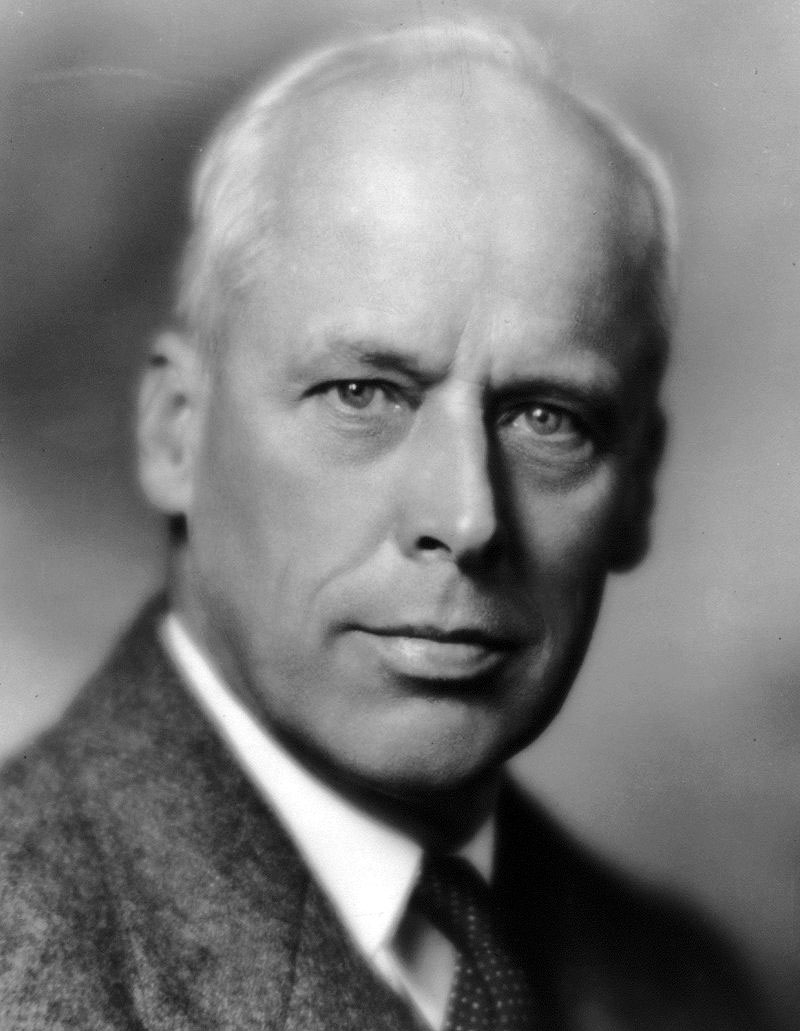 Norman Thomas (1884-1968), a Presbyterian minister, ran for President six times with the Socialist Party of America. He was an articulate advocate of democratic socialism and a pacifist.
Norman Thomas (1884-1968), a Presbyterian minister, ran for President six times with the Socialist Party of America. He was an articulate advocate of democratic socialism and a pacifist. Unemployed man in Detroit c. 1930. Recall that there was no unemployment
Unemployed man in Detroit c. 1930. Recall that there was no unemployment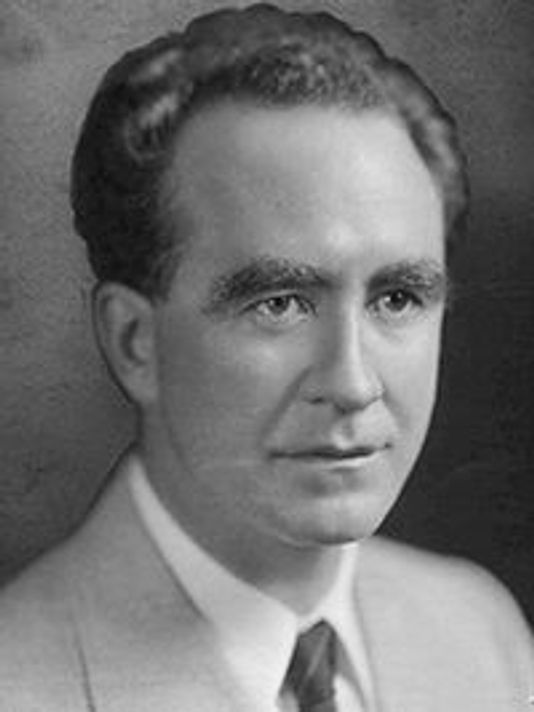 Mayor of Detroit 1930-1933, Frank Murphy went on to become Governor of MI, Governor-General of the Philippines, US Attorney General, and a US Supreme Court Justice. In 1933, he helped form the U.S. Conference of Mayors to lobby Washington for aid to cities.
Mayor of Detroit 1930-1933, Frank Murphy went on to become Governor of MI, Governor-General of the Philippines, US Attorney General, and a US Supreme Court Justice. In 1933, he helped form the U.S. Conference of Mayors to lobby Washington for aid to cities.  Detroit thrift gardens in 1931
Detroit thrift gardens in 1931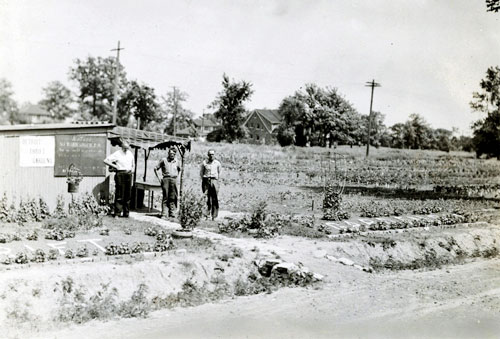 Election booths were recycled as storage sheds for tools and seeds.
Election booths were recycled as storage sheds for tools and seeds.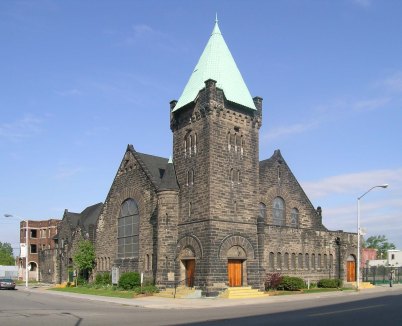 Cass Community M.E. Church. Many members had moved to the suburbs by 1928. The congregation decided to remain and minister to the changed neighborhood. During the Depression, the church ran a soup kitchen and sent volunteers to drive to rural areas & bring back trucks of food for distribution.
Cass Community M.E. Church. Many members had moved to the suburbs by 1928. The congregation decided to remain and minister to the changed neighborhood. During the Depression, the church ran a soup kitchen and sent volunteers to drive to rural areas & bring back trucks of food for distribution. 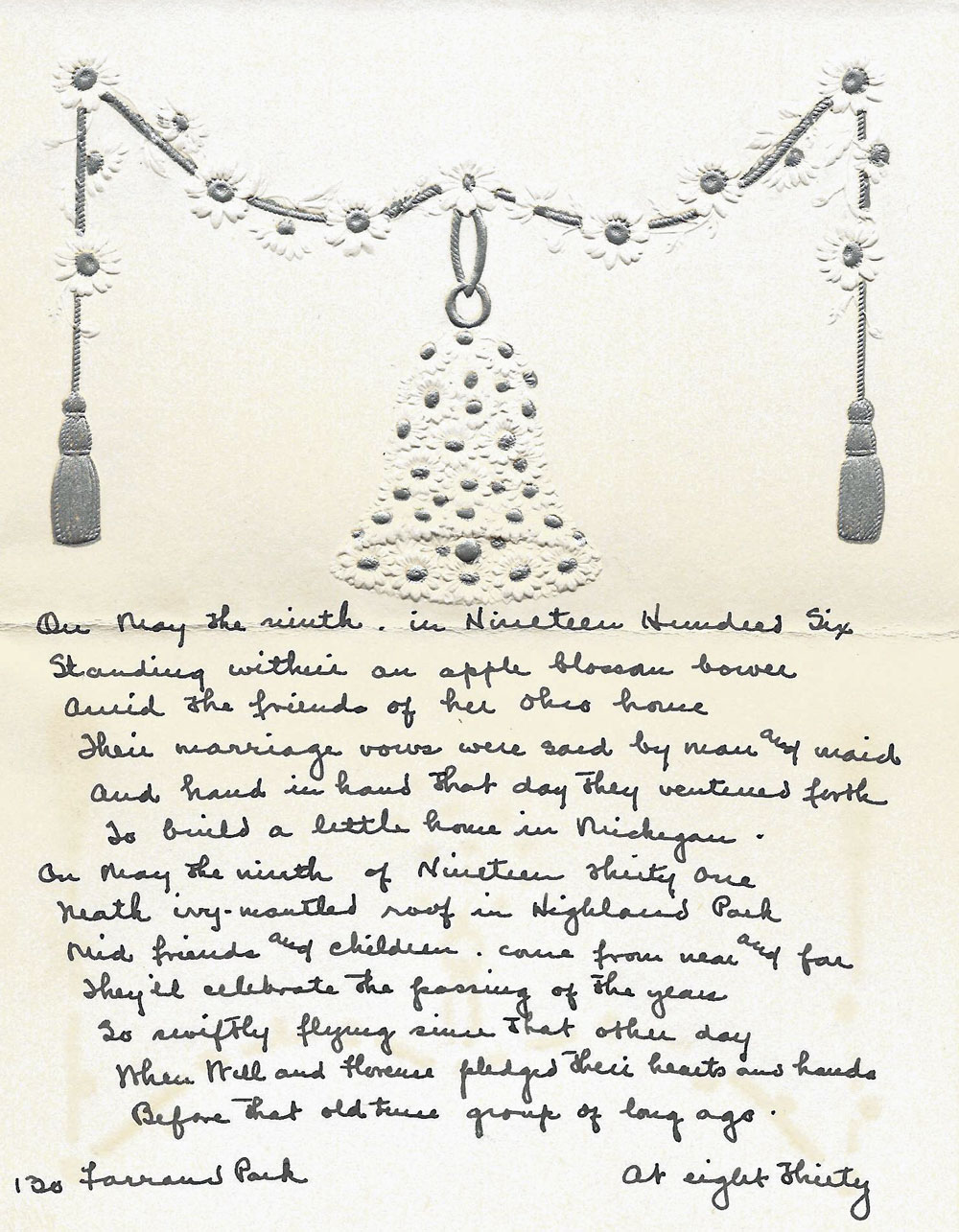
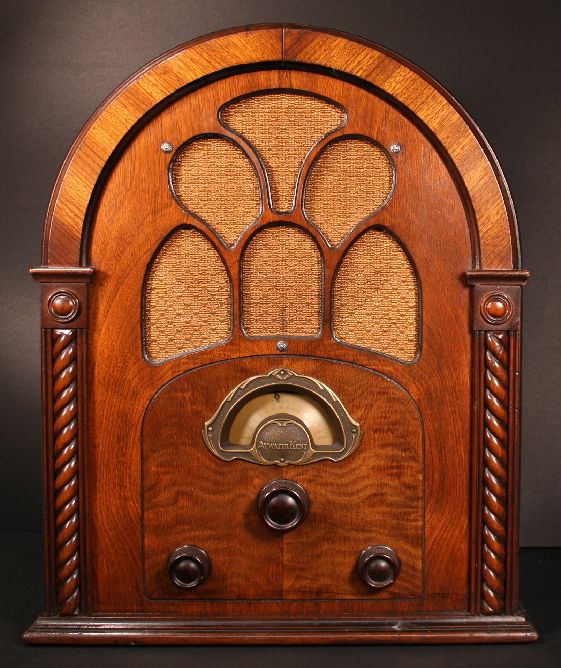 Typical radio c. 1931. This model was called a cathedral radio from the design of its case.
Typical radio c. 1931. This model was called a cathedral radio from the design of its case. Darwin tulips
Darwin tulips 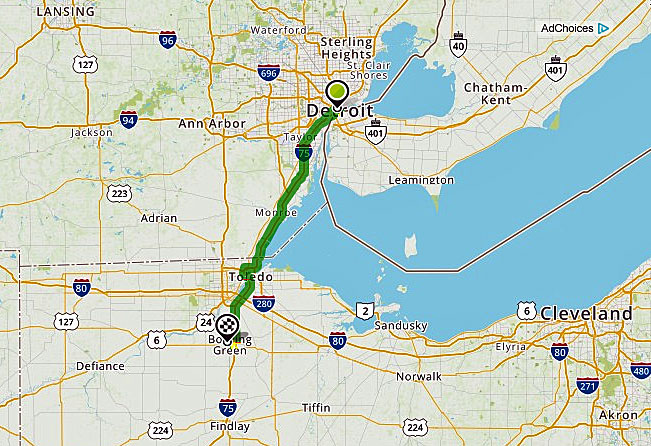
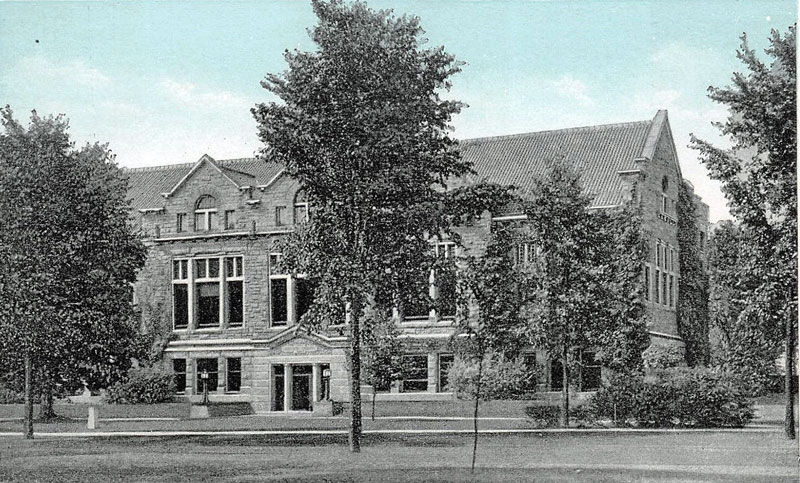 The Carnegie Library at Oberlin c. 1930. WHA & FGA made strong efforts to keep Bob, Bill, and Dick in college & the boys all worked PT as well.
The Carnegie Library at Oberlin c. 1930. WHA & FGA made strong efforts to keep Bob, Bill, and Dick in college & the boys all worked PT as well. 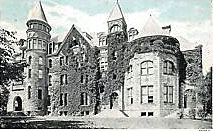 Kettering Hall of Science c. 1930 where Bob, a chemistry major, doubtless spent a lot of time. Kettering has been rebuilt & modernized several times since then. (Sorry, cannot find a larger photo.)
Kettering Hall of Science c. 1930 where Bob, a chemistry major, doubtless spent a lot of time. Kettering has been rebuilt & modernized several times since then. (Sorry, cannot find a larger photo.)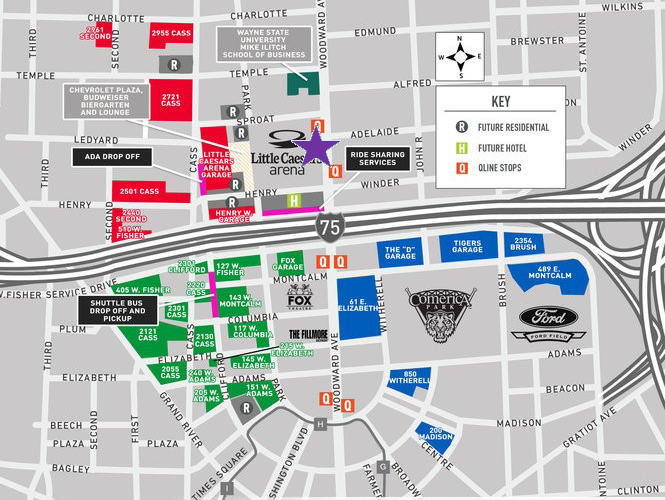 WHA’s office at 2529 Woodward was located at the purple star, now Little Caesar’s Arena, venue for the Detroit Red Wings & other sporting events & concerts.
WHA’s office at 2529 Woodward was located at the purple star, now Little Caesar’s Arena, venue for the Detroit Red Wings & other sporting events & concerts.